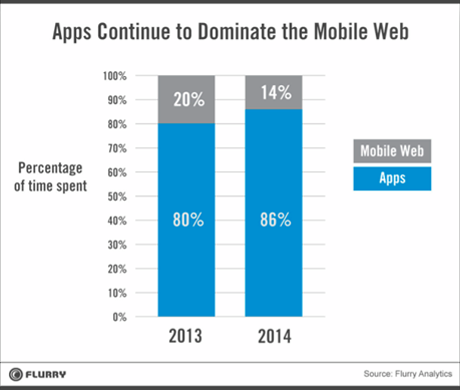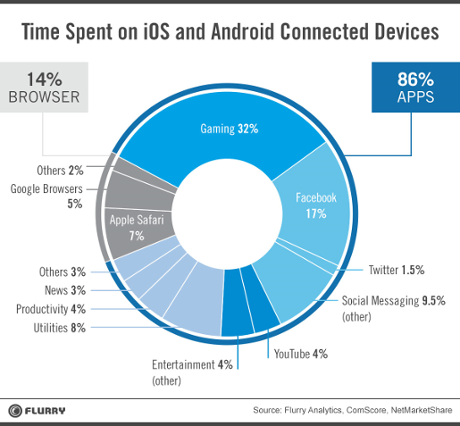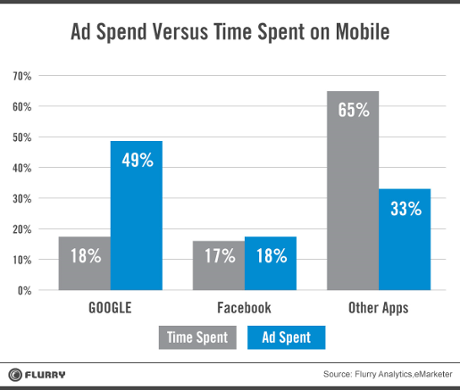 Owning a smartphone is now a common thing. When more people are using these mobile devices to browse the internet, old fashioned websites were redesigning themselves to use HTML5 to offer better mobile experience.
Owning a smartphone is now a common thing. When more people are using these mobile devices to browse the internet, old fashioned websites were redesigning themselves to use HTML5 to offer better mobile experience.
However, a research from Flurry has proven that this method is not as good as it can be.
HTML5 can create cross-platform mobile applications, and websites created from it can be great and flexible. They can be customized to great heights to accommodate different device preferences. HTML5 has created the idea for people to shift from using mobile apps to HTML5 websites offering the same functionality. But this hasn't played out quite well.
Flurry, an analytics firm, collected data from 450,000 mobile applications installed on over 1.3 billion devices worldwide.
The firm also clarified that it uses comScore to determine its figures on mobile browser usage and mobile applications, and uses NetMarketShare for the distribution of the browser usage.

The research shows that gaming is the biggest single category of use with 32 percent, followed by Facebook with 17 percent. Twitter has 1.5 percent, larger than most other social messaging with a total of 9.5 percent. YouTube made the chart with 4 percent, and News apps take the least with 3 percent.
Mobile websites has dropped by almost a quarter, from an average of 31 minutes daily in March 2013 to 22 minutes a year later. That has come even as people are spending longer on their phones - up on average to 2 hours and 42 minutes per day compared to 2 hours and 38 minutes in March 2013 - and that they spend even longer using apps rather than the mobile web.

According to Flurry's data, app use grew from 80 percent of peoples' phone use to 86 percent. Mobile web use dropped from 31 minutes to 22 minutes.
Although mobile apps have features preloaded, they are still using more resources on both the smartphone and internet connectivity than most mobile websites. Since the average global internet speed has increased, it indicates that connection speed is one of the factors that increase mobile apps' dominance. Better connection means that more people can use mobile apps without any issues.
"Both Google and Facebook have very well established franchises on mobile, but the market is still very fragmented," said Flurry. In fact, both companies' services combined probably have about 25 percent of the total time spent by the average mobile consumer.

Flurry has given Google a good news: far more mobile advertising money is spent with it than time is spent on its products. It calculates that although people spend about 18 percent of smartphone time in Google's services such as YouTube or in browsers where it can show ads, it received 49 percent of mobile ad spending.
By contrast, the social giant Facebook receives 18 percent of mobile ad spending.
Other apps beside the ones owned by the two giants are getting far behind. Flurry suggested: "the rest of the apps, including gaming apps, are simply not getting their fair share of advertising spent. [They] command 65 percent of time spent, but only receive 32 percent of ad revenue."
Which is Better for Me?
Mobile websites and apps can look very similar at first-glance. But they are more different that how they appear. Mobile websites are websites that are designed to be viewed on mobile devices by using mobile internet browsers. Mobile apps on the other hand, are applications that are downloaded and installed on your mobile device, rather than being rendered within a browser.
With mobile apps becoming more popular, should you ditch your mobile website to create a dedicated app instead? Not necessarily.
When it comes to deciding whether to build an app or a mobile website, the most appropriate choice really depends on your goals. If you are developing an interactive game, an app is probably going to be your best option. But if your goal is to offer mobile-friendly content to the widest possible audience then a mobile website is probably the choice to go. In some cases you may decide you need both a mobile website and a mobile app, but it's pretty safe to say that it rarely makes sense to build an app without already having a mobile website in place.
As a conclusion, mobile website should be considered your first step in developing a mobile web presence, whereas an app is useful for developing an application for a very specific purpose that cannot be effectively accomplished via a web browser.
